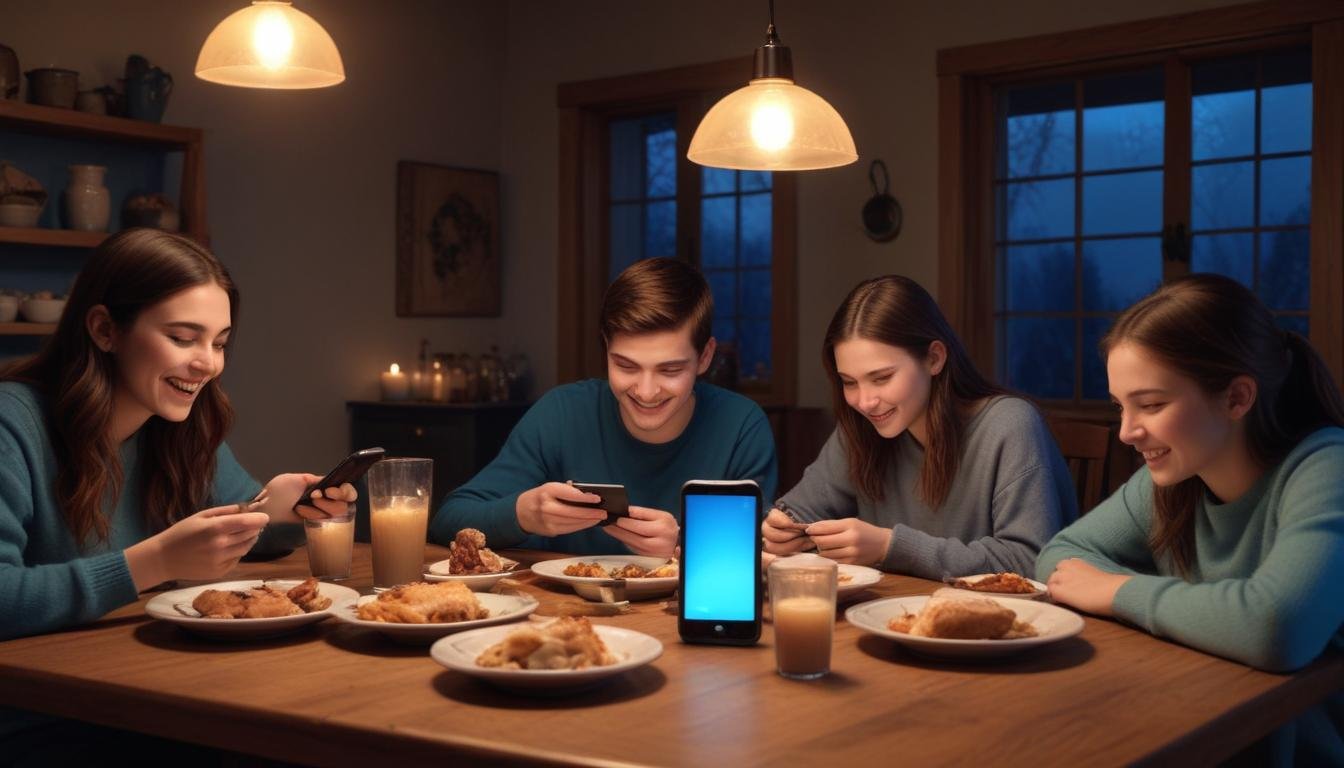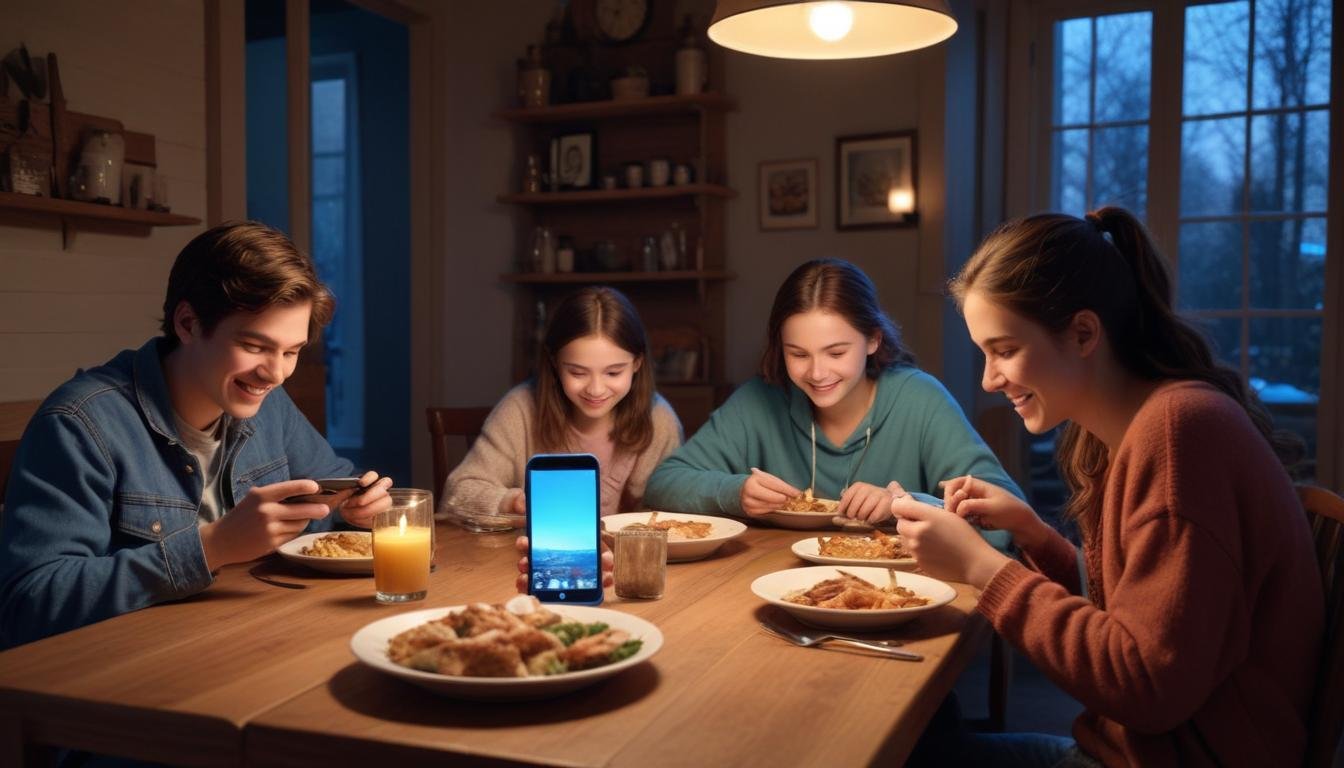How Social Media Affects Teen Sleep Patterns
Have you ever noticed how late your kids stay up on their phones? I have! As a dad of four, I’ve seen my children struggle with sleep because of their social media habits. It’s amazing how these platforms can keep them awake long into the night. I remember one evening, I went to check on Robert, my 14-year-old. He was scrolling through his phone in the dark, and it was almost midnight! I felt worried because I knew that not getting enough sleep can affect his teen health and focus at school.
Research shows that when teens use social media at night, it can really mess with their sleep patterns. The bright light from their screens tricks their brains into thinking it’s still daytime. My daughter Patricia, who’s 10, once told me how hard it was to wake up for school after staying up late chatting with her friends. It made me realize just how connected all this is— social media habits might seem harmless, but they can keep kids up longer and impact how they feel the next day.
We’ve started talking about bedtimes and the importance of sleep as a family. I often share stories from my own life about how important it was for me to get enough rest for my studies. I used to play video games late into the night, but I learned that it hurt my grades. It’s about teaching them that taking care of their health is cool! I tell them that every great adventure needs a good night’s sleep to be epic. If we can help them understand how important it is to sleep well, we’re giving them some fantastic parenting tools to build a healthy future.
Understanding the Risks of Nighttime Usage

When I think about the risks of nighttime social media use, I can’t help but remember a story from our family dinner table. We were all chatting about our day, and I asked Robert how he was doing in school. He hesitated and then said he was tired because he had been up late using his phone. It struck me then how easily our social media habits can sneak into our nighttime routines and affect our teen health. Just like that, a fun evening online can turn into a long, restless night.
As a cybersecurity expert, I know there are real dangers out there, from cyberbullying to online predators. But I also see the emotional risks that can come from constant social media use, especially at night. I remember one time, Patricia came home upset after reading something on a social media app that bothered her. She didn’t want to talk about it at first, but when I sat down with her, she opened up. It made me realize that social media can stir up feelings and worries that our kids might not be ready to handle. When we let them stay up late scrolling through their phones, we risk their emotional well-being.
In our household, we try to create a safe space where everyone feels comfortable sharing their thoughts. For example, on weekends, we have a fun family game night instead of letting the kids retreat into their screens. Sometimes, I’ll share stories from my childhood about the importance of balancing technology use with real-life fun. It’s all about giving them those parenting tools to understand that while social media is a part of our lives, it’s important to be mindful of how much time we spend on it, especially when it’s bedtime. I want them to remember the laughter we share over board games or the magic of reading a book together, instead of the endless scrolling that can lead to more worries.
Talk to your kids about what they see online. Let them feel safe to express their feelings. Together, we can help them understand the risks of their nighttime social media usage and empower them for the future! Through small conversations over a meal or during a car ride, we can make a big difference in shaping their habits. After all, health and happiness go hand in hand!
Establishing Healthy Boundaries

Setting boundaries around social media usage at night is super important for our kids. In our family, we decided to create some rules to help everyone get better sleep. We learned that when we have clear guidelines, our kids feel more relaxed and can enjoy their time online without it affecting their bedtime. For instance, we agreed that all screens should be put away an hour before bedtime. This time is for winding down and relaxing together, like reading books or talking about our day. I love looking at the kids’ faces when we share stories before bed—it’s a special moment for all of us.
One night, I gathered everyone in the living room for a family chat. I explained why we needed to have these rules. I told them about the importance of sleep and how it helps us feel good and happy. I shared a story from my own college days when I stayed up late studying and how it made it hard for me to focus in class. Michelle chimed in too, sharing how she wakes up refreshed and ready for her busy day when she gets a good night’s sleep. I could see the kids nodding, and I knew they started to get it.
Next, we created a family agreement. Each of my kids took part in writing down our rules about bedtime and social media habits. We all signed it and hung it on the fridge as a reminder. This gave them a sense of ownership, and I could see they were more committed. When we made it a team effort, it felt more like a fun challenge rather than strict rules! I also encourage my kids to have some tech-free time during the evenings. That means no electronics during dinner or family time. We really cherish those moments where we can connect without distractions.
We also love to celebrate when we stick to our rules. For example, if everyone puts their phones away on time for a whole week, we treat ourselves to a fun weekend activity, like going to the park or having a movie night. This way, they see that following the guidelines can lead to special family adventures. I feel that positive reinforcement can go a long way in teaching kids about healthy boundaries and responsible use of technology.
Sometimes, I like to remind them that it’s all about balance. Just like eating sweets is okay in moderation, the same goes for social media. By teaching them these parenting tools, we can help them a lot now and in the future. I want my kids to grow up knowing they can enjoy their social media time, but also prioritize their health and well-being.
Implementing Effective Monitoring Techniques

One of the best ways I found to keep track of our kids’ social media habits is to use monitoring tools. There are many apps designed to help parents manage and monitor what their kids do online. This was really helpful for us! I remember when we first started using one of these apps, I was so curious to see how much time the kids were spending on their phones. It gave us the chance to have open conversations about their usage, which made them feel more involved. If Robert spent too much time scrolling instead of sleeping, we could talk about it rather than just assuming he was being sneaky.
Not long ago, I discovered that Mark and Matthew were really into a new gaming app. I decided to check it out with them. When they showed me how it worked, I was amazed! They loved playing and chatting with their friends, but we noticed that they were often doing it late at night. So, we used this as an opportunity to set up a family meeting. In a fun way, we talked about how something that is enjoyable shouldn’t take away from their sleep. I shared how I could never focus well at work when I didn’t sleep enough, and they listened! It started a cool conversation about balance and being responsible.
We also decided to make our computer and tablets family devices. This means that everyone knows the rules around them, and it encourages us to be more mindful. It makes it easier to stay connected as a family. For example, at dinner, we could put the devices down and have fun talking about our day. I love hearing Patricia laugh when she shares a funny story from school. Even Robert enjoys joking around with his younger brothers. It’s heartwarming to see how this simple choice can create memorable moments for us all.
When I realize that they need a little extra help, I talk to my kids about how to be responsible with their own tech time. I encourage them to think of ways they can keep themselves accountable. For instance, I once suggested trying a social media free night together. Surprisingly, they really looked forward to it! During that time, we played board games or read books. This showed them how fun it can be to spend time together without devices. It became a special evening tradition we all enjoy more than we expected!
Using these monitoring techniques can feel like a team project. I often share stories about my job and how I’m always monitoring cyber threats to keep users safe online. It’s a great conversation starter and teaches my kids that awareness is essential in everything we do, even with social media. These parenting tools help guide them toward healthier habits and keep their teen health in check. I want my kids to feel empowered to manage their own time online, understand what they do, and recognize when it’s time to shut it down for the night!
FAQ

Sometimes, I get questions from other parents about how to deal with their teens and social media. One popular question is about how to stop late-night scrolling. I tell them it’s all about communication! I remember a time when Michelle and I were having dinner with another couple. They expressed their worry about their daughter staying up late texting her friends. I shared my experience and how my family handles that same issue.
I explained how important it is to talk with our kids about their social media habits. I like to ask simple questions like, “What are you enjoying about your time online?” or “How do you feel when you wake up after a late night on your phone?” These conversations help them reflect on how their actions affect their daily lives, especially their teen health. Last week, I asked Robert this kind of question, and it opened up a great chat about how he struggles to concentrate in school when he doesn’t sleep well. It made him realize how late-night texting really affects him!
Another question I hear often is about setting rules without being too strict. I get it! As a parent, we want to guide our kids, but we also want them to feel trusted. In our family, we try to create a guiding framework, rather than strict rules. For example, we have tech-free family time every evening after dinner. It’s a chance for us to connect, and the kids know this time is important. I always say, “This is our time, and let’s make it special!” It works wonders!
Some parents also ask about monitoring apps. I tell them that using these tools can really help keep everyone on track. They provide valuable insights into how long our kids spend on their devices. One night, I discovered that Mark had been playing a game for much longer than we thought. So, we turned it into a fun learning experience. We all sat together and looked at the numbers. We laughed, we learned, and we made a plan together. This way, I didn’t feel like the ‘bad guy’ telling them what to do. Instead, we worked as a team!
Lastly, I often hear about how tough it is to keep kids off their devices when everyone is connected. The internet can seem way too fun to resist! I always suggest engaging our kids in other activities. The weekend before last, we took a family hike and left our phones at home. We played games, explored nature, and shared stories. It was a blast! After that day, I saw how much they appreciated the fresh air and family time, and we all agreed to do it more often. These parenting tools, like family adventures, can counterbalance social media habits and fill our lives with wonderful memories!
About me
I’m Dr. Victor Lee, and cybersecurity is more than a career; it’s my passion. With my doctorate in Computer and Information Security and over 20 years of experience, I’ve witnessed the evolution of cybersecurity firsthand. I believe in sharing knowledge to make a difference, which has inspired me to teach college-level courses online. My mission is to make a meaningful impact in the fight against cyber threats.
I’m happily married and a proud father of four amazing children. My wife, Michelle, is a talented marketing manager in her 40s. We have twin sons, Mark and Matthew, who are 8 years old and bring so much joy to our lives. Our daughter, Patricia, is 10 years old and thriving in middle school. Our oldest, Robert, is a 14-year-old high school student embracing new challenges. As a family, we call the beautiful city of Fresno, California, our home.


